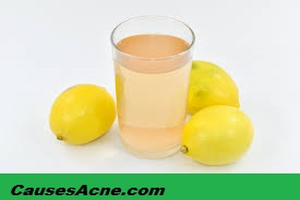
Topical Lemon Treatment for Acne
Many acne sufferers have reported that using a lemon juice solution directly on their skin has helped to improve their acne. So, how does it work? Lemons contain very high levels of citric acid (also known as l-ascorbic acid). This acid works in several ways to combat the unfortunate effects of acne breakouts.
First, the citric acid has disinfecting properties (which is why it is commonly used in household cleaning products). This means that it kills bacteria, aiding in pimple reduction. It also helps eliminate dead skin cell buildup, which helps prevent clogged pores and subsequent acne lesions. On top of getting rid of pimples, this exfoliating effect leaves you with a healthier and more radiant looking complexion.
An additional benefit of using lemon juice to treat acne externally is the lightening effect of the citric acid. Using lemon juice to brighten hair has long been a well known beauty trick, and it can also work similarly for skin. The mild bleaching effect of the citric acid can serve to reduce the appearance of discoloration and scarring from previous acne lesions.
If you’re going to try using lemon juice to treat acne this way, it’s best to start slowly and with a small amount. Because it is so acidic, lemon can cause discomfort and even pain when applied directly to the skin. It is for this reason that aestheticians recommend using a heavily diluted mixture of lemon juice and water (usually no more than a 50/50 blend) to treat acne. You should be able to gradually increase the ratio as your skin gets used to the citric acid, depending on how sensitive it is. Use distilled water, spring water, or filtered water if possible.
You can apply the lemon juice for acne treatment up to twice per day using a cotton ball or cosmetic pad soaked in the mixture. You can also put it into a clean spray bottle with some water and mist your face with it. Just remember to shake it up before you do so the acids are evenly distributed – and to close your eyes before spraying! Store the lemon/water mix in your refrigerator. This will help keep it fresh for at least a couple of days, and the coolness will also help relieve a bit of the citric acid sting.
A word of caution, though: don’t use any citrus juice directly on open lesions. Just like with any open wound, doing so would not only be painful, but can make your pimple worse by irritating it too much.
Drinking Lemon Juice for Acne Relief
Many people report using lemons to treat acne internally. Citric acid works to change the body’s pH to a more alkaline state. When the body is less acidic, overall inflammation – which can lead to acne outbreaks – is reduced. The juice from this useful fruit also aids in ridding the body of toxins, as it helps to flush out potentially harmful substances that are accumulated over time.
Just like when using it directly on the skin for acne treatment, you’ll want to dilute the lemon juice with good clean water before drinking it. You can do this according to your own personal preferences, and it may take a few tries to get it just right. Also, don’t use any sugar to sweeten the concoction or you’ll be working against yourself, as sugar causes inflammation and will counteract the alkaline state induced by by the citric acid.
You can drink lemon juice every day, and it’s best to do it at least 20 or 30 minutes before eating anything. This will allow for maximum absorption and effectiveness. If you find that drinking it this way gives you a stomach ache, try adding more water. You can also use hot water for an acne fighting lemon tea. Many people find this to be more gentle and easier to digest.
Using lemon juice to treat acne can be an effective and inexpensive weapon in your fight against breakouts.
